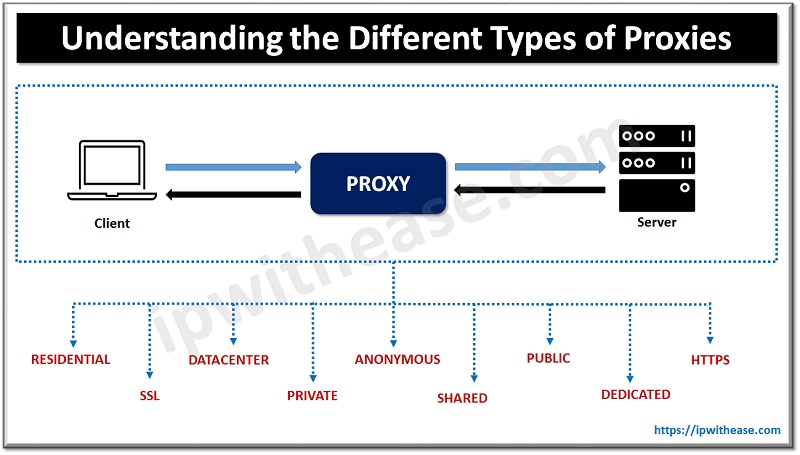Proxies are like digital bodyguards for your online activities. They act as middlemen between your device and the internet, keeping your identity safe and helping you access restricted content. There are several types of proxies, each with its own special uses. Understanding these can help you choose the right one for your needs, whether it’s for privacy, speed, or getting around online roadblocks.
What is Proxy?
A proxy is an intermediary server that sits between your device and the internet. It hides your real IP address, making your online activities more private and secure. Proxies can help you access restricted content, manage multiple accounts, and improve browsing speed by caching data. They are essential tools for enhancing online privacy and security.
Types of proxy
- Residential proxy:
Residential proxy use IP addresses assigned by ISPs to real homes, making them appear as though they originate from an actual residential location. These proxies are highly effective for web scraping, accessing restricted websites, and avoiding detection because they blend in with normal user traffic. By routing requests through real residential IP addresses, residential proxies provide a genuine online presence that minimizes red flags and alarms, making them essential for tasks requiring high anonymity and reliability.
Uses: They are excellent for web scraping, accessing restricted websites, and avoiding detection since they look like normal user traffic.
- Data Center proxy:
Data center proxies come from data centers and provide IP addresses that are not affiliated with ISPs. These proxy are typically faster and more cost-effective than residential proxy, making them ideal for high-speed tasks like bulk data collection and automated processes. However, because they do not originate from real residential locations, data center proxies are more easily detected and blocked by websites, which can be a drawback for certain applications that require higher levels of anonymity.
Uses: They are commonly used for high-speed tasks, such as bulk data collection and automated processes. However, they are easier to detect and block compared to residential proxy.
- Anonymous proxy:
Anonymous proxy hide your IP address and other personal information from websites you visit, providing a good level of privacy. These proxies do not reveal your real IP address to the websites you access, making it difficult for websites to track your online activities. Anonymous proxies are ideal for maintaining privacy while browsing, preventing online tracking, and protecting your identity from potential threats. They offer a balance between anonymity and performance for general internet use.
Uses: Ideal for maintaining privacy while browsing and preventing websites from tracking your online activities.
- Transparent proxy:
Transparent proxy do not hide your IP address and openly inform websites that they are proxy servers. While they do not provide anonymity, they are useful for content filtering, caching, and monitoring internet usage within organizations. Transparent proxy allow administrators to control and regulate internet access, improving network performance and security. They are commonly used in schools, libraries, and workplaces where monitoring and filtering of web traffic are necessary.
Uses: Often used for content filtering and caching by organizations to control and monitor internet usage.
- Elite proxy:
Elite proxy, also known as high-anonymity proxy, provide the highest level of anonymity by completely hiding your IP address and not revealing that they are a proxy. These proxies ensure maximum privacy and are undetectable by websites, making them ideal for sensitive online transactions, high-stakes data scraping, and activities requiring the utmost confidentiality. Elite proxies offer robust protection against online tracking and surveillance, making them the preferred choice for users needing the highest level of anonymity.
Uses: Best for activities that require maximum privacy and anonymity, such as sensitive online transactions and high-stakes data scraping.
Uses of proxy
1.Web Scraping:
proxy, especially residential ones, are used to collect data from websites without getting blocked. This is useful for market research, price comparison, and gathering large amounts of public data.
2.Accessing Geo-Restricted Content:
proxy can help you access content that is restricted to certain countries. For example, using a proxy located in the USA to watch a video that is only available there.
3.Enhancing Privacy and Security:
By hiding your IP address, proxies protect your online identity and keep your browsing activities private from hackers and trackers.
4.Managing Multiple Accounts:
Businesses and individuals often use proxies to manage multiple social media accounts or online profiles without being detected and banned for violating platform rules.
5.Speed and Bandwidth Management:
A proxy can help in controlling and optimizing internet traffic, which is beneficial for organizations looking to manage their bandwidth usage efficiently.
Conclusion
Proxies are powerful tools that can enhance your online experience in many ways. From residential proxies that offer high anonymity to data center proxies that provide speed, each type serves a specific purpose. Knowing how to use these different proxies can help you stay safe, access restricted content, and manage your internet traffic more efficiently. Residential proxies, in particular, offer a robust solution to many web scraping challenges, making them a valuable investment for anyone serious about data collection.




